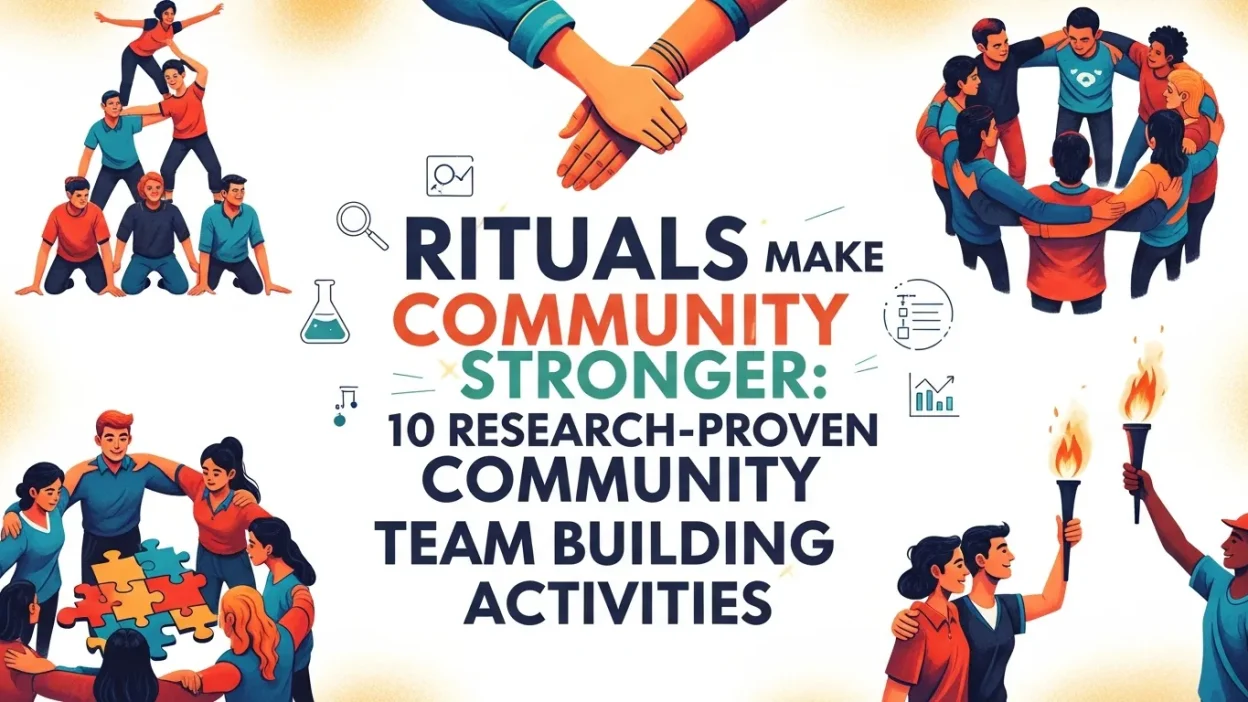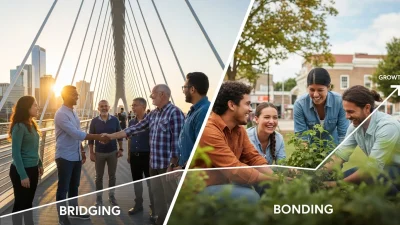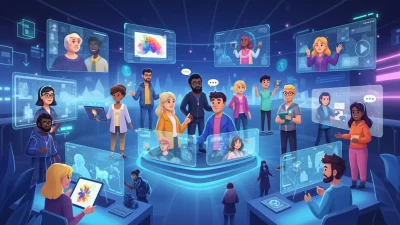Strong professional relationships are the foundation of any successful team. Beyond games or retreats, the real power of team-building lies in creating rituals that make community stronger. Repeated, meaningful practices—such as weekly check-ins, themed lunches, story circles, and volunteer days—build trust, foster collaboration, and create a sense of belonging. By embedding rituals into everyday workflows, organizations strengthen morale, enhance communication, reduce conflicts, and cultivate a culture of connection and long-term success.
Strong professional relationships are the foundation of any solid team. Whether you’re building the next tech unicorn or launching your own apparel line, fostering an environment of trust, collaboration, and camaraderie is critical to your company’s longevity. However, team-building exercises often have a bad reputation. Too many trust falls, awkward icebreakers, and generic retreats leave employees disengaged, skeptical, or bored.
The good news? When done thoughtfully, team-building activities can energize your workforce, enhance collaboration, minimize conflict, and ultimately create a strong sense of belonging. At the heart of this lies one principle: rituals make community stronger. Repeated, meaningful rituals help teams develop shared experiences, collective memory, and stronger interpersonal bonds.
This article explores 10 research-backed team-building activities, strategies to implement them effectively, and guidance on designing workplace rituals that strengthen community, boost morale, and drive long-term success.
Why Team Building Matters

Team-building is much more than grabbing lunch together or hosting an annual off-site. Done right, it fosters communication, collaboration, trust, and unity. Its effects go far beyond one-off experiences—team-building helps shape a culture where employees feel invested, supported, and motivated.
Key Benefits of Team Building
-
Drives Productivity: Teams that communicate and collaborate effectively solve problems faster and make better decisions.
-
Boosts Morale: A supportive environment increases job satisfaction, engagement, and overall happiness.
-
Promotes Collaboration: Teams that understand each other’s strengths and weaknesses can leverage them efficiently to achieve goals.
-
Reduces Conflicts: Healthy bonds and clear communication reduce workplace friction.
-
Retains Talent: Employees are more likely to stay in organizations where they feel connected to colleagues and a shared mission.
Embedding rituals into team-building initiatives ensures that rituals make community stronger, turning activities into lasting cultural practices rather than one-time events.
The Science Behind Rituals and Team Building
Rituals are structured actions repeated in predictable patterns that provide stability, meaning, and a sense of belonging. In a workplace, rituals help:
-
Establish shared expectations
-
Reinforce group identity
-
Build trust and cohesion over time
Research in organizational behavior shows that teams that adopt small, regular rituals—like weekly stand-ups, themed lunches, or recognition ceremonies—develop stronger interpersonal bonds. These rituals transform team-building from a simple activity into a community-strengthening practice.
The Emotional Power of Workplace Rituals
Rituals are a powerful tool for strengthening emotional connections within a team. When employees participate in recurring practices, they develop a sense of continuity and belonging. Whether it’s starting the week with a brief check-in or celebrating project milestones, rituals help teams experience shared emotions and collective triumphs. Over time, these moments of connection create a culture where team members feel supported and valued. Simply put, rituals make community stronger by turning everyday interactions into meaningful experiences that bind people together.
How Rituals Strengthen Team Bonds
Rituals are more than just repetitive actions—they are the glue that binds teams together. By embedding small, meaningful rituals into daily workflows, teams cultivate a sense of shared purpose, belonging, and trust. These rituals help employees connect emotionally and professionally, fostering collaboration that goes beyond formal meetings.
Key ways rituals make community stronger:
- Shared experiences: Regular rituals create collective memories that build team identity.
- Predictability and stability: Repeated actions provide comfort and reduce workplace stress.
- Recognition and celebration: Celebrating achievements through rituals strengthens morale.
- Fosters empathy: Rituals that encourage open communication improve understanding among team members.
10 Team Building Exercises That Build Effective Teams
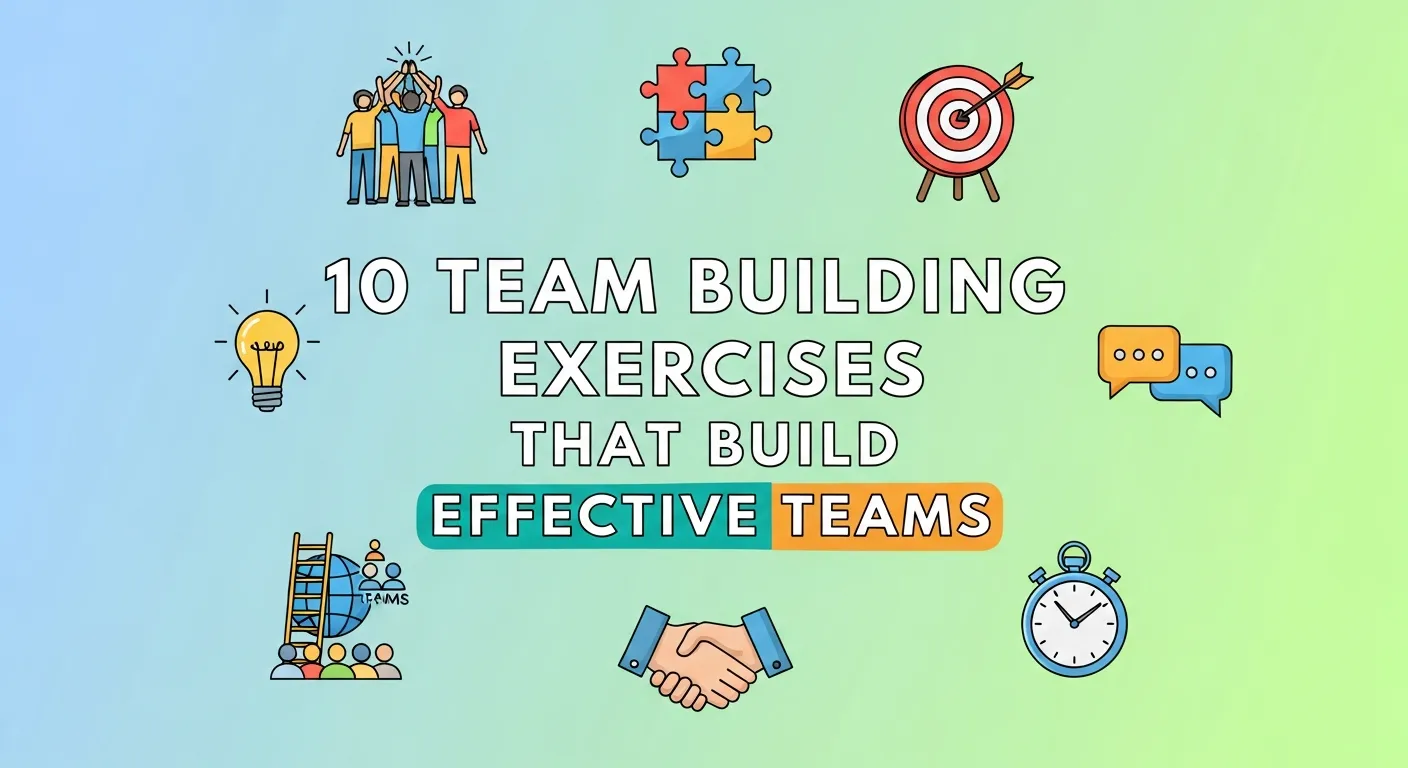
1. The Problem-Solving Challenge
How it works: Present your team with a real-world challenge from your industry. Teams collaborate to create solutions within a set timeframe.
Impact:
-
Fosters creativity and innovation
-
Strengthens decision-making and critical thinking
-
Builds trust and problem-solving synergy
Tips:
-
Break into small groups to ensure everyone contributes
-
Debrief after the activity to discuss lessons learned
-
Make challenges recurring events to embed problem-solving as a team ritual
Ritual Connection: Regular problem-solving sessions reinforce shared learning and collaboration, showing how rituals make community stronger.
2. Escape Room Adventure
How it works: Take the team to an escape room or use a virtual escape room platform. Teams solve puzzles to “escape” within a set time.
Impact:
-
Builds collaboration under pressure
-
Encourages leadership and delegation
-
Strengthens team dynamics and creative thinking
Tips:
-
Debrief afterward to discuss strategies and outcomes
-
Rotate leadership roles to develop multiple team leaders
Ritual Connection: Quarterly escape rooms create shared milestones and memories, reinforcing community and teamwork.
3. Role Reversal
How it works: Team members swap roles for a day to learn different perspectives and responsibilities.
Impact:
-
Fosters empathy and understanding among colleagues
-
Promotes knowledge sharing and cross-functional collaboration
-
Helps reduce silos and communication gaps
Tips:
-
Strategically pair team members to maximize learning
-
Incorporate storytelling sessions for reflections
Ritual Connection: Recurring role reversals create empathy-based rituals that strengthen bonds and communication.
4. Volunteer for a Good Cause
How it works: Organize a team volunteer day at a local charity, park, or food bank.
Impact:
-
Builds emotional bonds through shared purpose
-
Improves morale and fulfillment
-
Strengthens company culture outside the office
Tips:
-
Poll your team to choose a meaningful cause
-
Share photos and stories to build post-event community
Ritual Connection: Annual volunteer days become symbolic rituals that show how rituals make community stronger.
5. Two Truths and a Lie
How it works: Each team member shares three statements about themselves—two true, one false. Others guess the lie.
Impact:
-
Encourages camaraderie and fun
-
Breaks down barriers for new employees
-
Creates a relaxed, inclusive culture
Tips:
-
Keep it light and professional
-
Rotate the facilitator to involve everyone
Ritual Connection: Monthly icebreakers can serve as recurring rituals that build connection and belonging.
6. Office Olympics
How it works: Organize workplace challenges such as chair races, trivia contests, or paper-airplane competitions.
Impact:
-
Boosts morale and team energy
-
Encourages friendly competition and creativity
-
Promotes informal bonding
Tips:
-
Offer small prizes to motivate participation
-
Rotate events to keep excitement high
Ritual Connection: Annual Office Olympics create memorable rituals that reinforce team identity and collaboration.
7. Team Lunch with a Twist
How it works: Host a themed potluck (e.g., international cuisine) where team members share dishes.
Impact:
-
Encourages self-expression and informal conversation
-
Promotes cultural awareness and inclusion
-
Builds community shared experiences
Tips:
-
Use lunches to celebrate achievements or project completions
-
Rotate themes to maintain interest
Ritual Connection: Monthly themed lunches act as recurring rituals that foster belonging and connection.
8. The Marshmallow Challenge
How it works: Teams use spaghetti, tape, string, and a marshmallow to build the tallest freestanding structure.
Impact:
-
Encourages creative thinking and teamwork
-
Highlights the importance of preparation and iteration
-
Fosters experimentation without fear of failure
Tips:
-
Emphasize learning and fun over winning
-
Reflect post-activity to apply lessons to work
Ritual Connection: Regular challenges like this build rituals of innovation and collaboration, showing that rituals make community stronger.
9. Story Circles
How it works: Team members sit in a circle and take turns adding a sentence to build a collective story.
Impact:
-
Improves listening, cooperation, and creativity
-
Encourages participation in a relaxed setting
-
Enhances group cohesion
Tips:
-
Incorporate company or industry-related themes
-
Record sessions for reflection and storytelling continuity
Ritual Connection: Biweekly story circles build recurring, bonding rituals that strengthen team identity.
10. Feedback Swap
How it works: Team members pair up to exchange constructive and positive feedback.
Impact:
-
Develops communication skills and emotional intelligence
-
Encourages growth and trust
-
Promotes a culture of openness
Tips:
-
Use frameworks like “Situation-Behavior-Impact” for structured feedback
-
Ensure psychological safety for honesty
Ritual Connection: Regular feedback swaps build trust rituals that reinforce the principle that rituals make community stronger.
How to Choose the Right Team-Building Activity
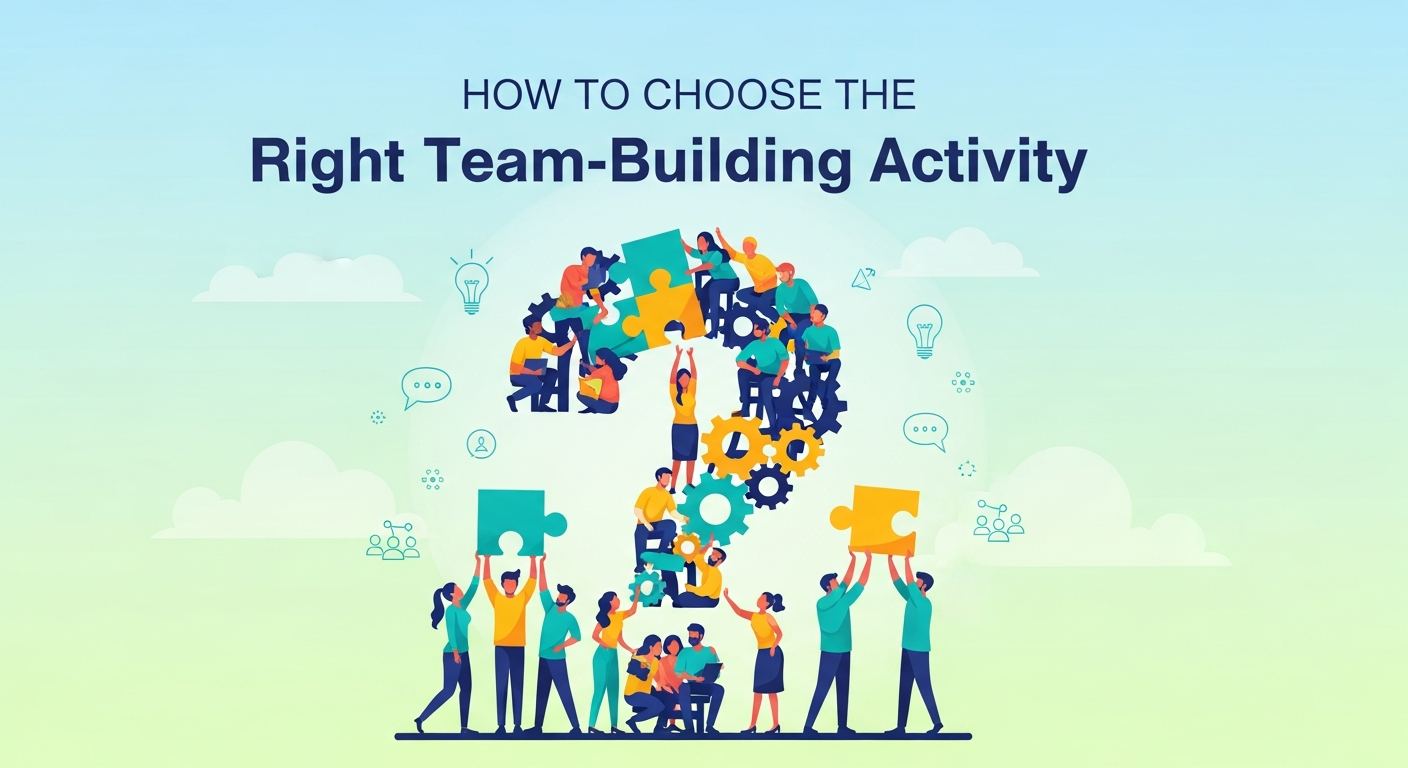
Not every exercise works for every team. Consider:
| Factor | Considerations | Examples |
|---|---|---|
| Team Size | Large vs. small | Large: Office Olympics; Small: Story Circles |
| Team Dynamics | Newly formed vs. established | Icebreakers for new teams; Problem-solving for mature teams |
| Environment | Remote or in-person | Virtual escape rooms for remote teams |
| Goals | Morale, collaboration, creativity | Match activities to intended outcomes |
Embedding activities into a recurring cadence creates rituals, transforming team-building from a single event into ongoing culture-strengthening practices.
Rituals as the Backbone of Team Culture
The most successful teams don’t just rely on occasional activities; they embed rituals into their daily and weekly routines. These rituals establish a predictable rhythm, reduce uncertainty, and give employees something to look forward to. Whether it’s a morning huddle, a monthly lunch, or an end-of-week reflection, these repeated practices help solidify team identity and shared values. By integrating rituals into the workflow, organizations ensure that team-building isn’t a one-time effort but a lasting cultural habit, showing clearly that rituals make community stronger.
Designing Rituals That Build Strong Communities
Transforming team-building into lasting rituals ensures that activities aren’t forgotten after the day ends. The most effective rituals are simple, repeatable, and aligned with team values. By creating rituals, teams continuously reinforce their culture, strengthen connections, and maintain a high level of engagement.
Checklist for designing effective workplace rituals:
-
Align with team values and goals
-
Keep them simple and easy to repeat
-
Encourage participation from all team members
-
Combine fun with reflection
-
Celebrate milestones and achievements
How Rituals Make Community Stronger in the Workplace
Rituals create shared experiences that strengthen trust, identity, and emotional connection among team members.
Key Benefits:
-
Reinforces shared values and behaviors
-
Builds collective memory and identity
-
Reduces stress by providing familiar touchpoints
-
Strengthens emotional bonds and trust
Examples of effective workplace rituals:
-
Weekly team check-ins
-
Monthly themed lunches or problem-solving sessions
-
Quarterly volunteer days or office Olympics
These repeated, meaningful rituals show that rituals make community stronger, improving engagement, collaboration, and overall team performance.
Embedding Rituals for Lasting Impact
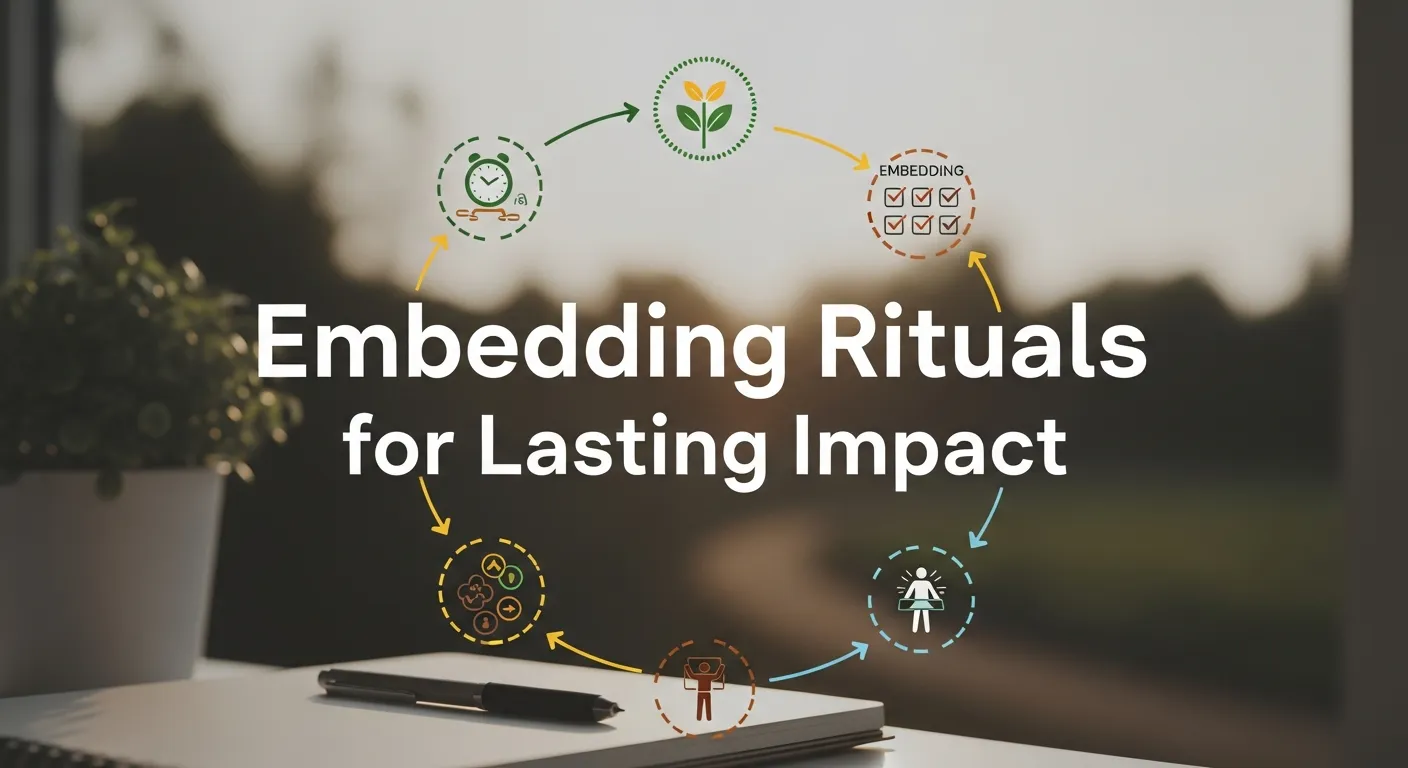
To make rituals an integral part of your team culture, consistency is key. Repeated, meaningful practices encourage employees to invest emotionally in their team and organization. Over time, these rituals create a foundation of trust, belonging, and collaboration that cannot be achieved through one-off activities.
Tips to embed rituals into daily work:
-
Schedule recurring rituals on calendars to ensure participation
-
Encourage rotation of leadership or facilitation roles
-
Pair rituals with recognition or reflection to amplify impact
-
Evaluate and adapt rituals based on team feedback
Conclusion
Team building is more than games or retreats—it’s about creating lasting rituals that strengthen community. By combining fun, collaboration, and reflection, organizations can enhance communication, morale, and trust.
When designing team-building activities, aim to embed them into regular workflows to create traditions that endure. Strong rituals form the backbone of a connected, high-performing team. Remember: rituals make community stronger, and strong communities drive both employee satisfaction and organizational success.
12 FAQ
1. What is the main purpose of team-building rituals?
Team-building rituals aim to create repeated, meaningful experiences that strengthen trust, collaboration, and a sense of belonging among team members.
2. How do rituals make community stronger in the workplace?
Rituals create shared experiences, establish predictable routines, reinforce values, and foster emotional bonds, which collectively strengthen workplace community.
3. Can small rituals really impact team performance?
Yes, even small rituals like weekly check-ins or short storytelling sessions improve communication, collaboration, and morale, positively influencing overall team performance.
4. How often should team rituals occur?
Frequency depends on the ritual type—weekly or biweekly for check-ins, monthly for themed lunches, and quarterly for larger activities like volunteer days. Consistency is key.
5. Are rituals only for in-person teams?
No, virtual teams can also benefit. Online rituals, such as virtual coffee breaks, remote story circles, or digital recognition sessions, can build strong community bonds.
6. Can rituals help reduce workplace conflicts?
Yes, regular rituals improve communication and understanding among team members, which minimizes misunderstandings and reduces workplace friction.
7. What are some simple examples of effective workplace rituals?
Examples include weekly stand-ups, monthly problem-solving sessions, story circles, feedback swaps, themed lunches, and quarterly volunteer activities.
8. How do rituals foster trust among team members?
Repeated, predictable rituals give employees confidence in their team’s reliability, encourage transparency, and create a safe environment for sharing ideas.
9. Are team-building games enough to create a strong community?
Not alone. Games can be fun, but embedding them into recurring rituals ensures lasting impact and helps create a strong, connected team culture.
10. Can rituals improve employee retention?
Yes, employees who feel connected and valued through regular rituals are more likely to stay with an organization and remain engaged in their work.
11. How can leaders ensure rituals are inclusive?
Leaders should involve all team members in planning, respect cultural differences, and ensure activities allow participation from everyone regardless of role or location.
12. What is the ultimate benefit of embedding rituals into team-building activities?
Embedding rituals transforms one-time events into enduring practices, enhancing morale, collaboration, trust, and a strong sense of community—demonstrating that rituals make community stronger.


